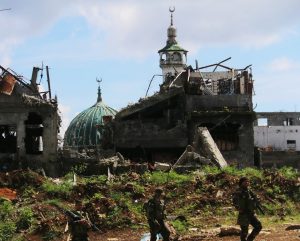The revelation wasn’t entirely unexpected, but it put into sharp focus the need for the Filipino government to get its priorities in order when it comes to the restive region of Mindanao. On November 19, the head of the government’s task force for the reconstruction of the city of Marawi, razed to the ground in 2017 during heavy fighting with jihadists, disclosed that only “about 20 to 30 percent” of the targeted reconstruction has so far been accomplished. This not only implies that the process will not be completed before the promised deadline of December 2021, but most likely that it will not happen before the end of President Rodrigo Duterte’s term in 2022, casting a dark shadow over what could arguably be his greatest legacy: lasting peace in the country’s troubled south.
Three years after the end of the Marawi siege, which saw the Philippine military fight to take back a town captured by ISIS-affiliated fighters for a full five months, not only is the city still largely in ruins and 125,000 of its inhabitants still displaced, but public disaffection toward the government’s rehabilitation plans now threatens to fuel militancy and radical views that could lead to more violence in the region. The government has released only half of the budget required to rebuild the city, and earmarked a meager 5 billion pesos for next year, making it unlikely things will speed up in the near future.
Duterte appears unconcerned: his spokesman recently stated that he was “satisfied” with the rehabilitation efforts but would “appreciate” if it could be hastened. Back in July, the president’s failure to mention the Marawi rehabilitation in his State of the Nation Address had already raised concerns that it was no longer a priority of his administration. Since, he has further angered locals by blaming the delays on property ownership issues related to cultural practices and traditional clan structures of the Maranaos, the ethnic group living in the Marawi region.
Apart from alienating the local population, these delays bode ill for the prospect of lasting peace in the wider Mindanao region, presently undergoing a fragile political transition. Led by the ex-rebels of the Moro Islamic Liberation Front (MILF), the new autonomous Bangsamoro government established last year is touted as one of Duterte’s greatest achievements – often presented as an “antidote to extremism” after decades of militancy. But failure to address the grievances of the Maranaos, one of the largest Muslim-majority ethnic groups that make up the Bangsamoro people, could undercut the community’s fragile confidence not only in the national government but also in the regional transitional authority. Worse, it could fuel polarization among diverse ethnic groups in the Bangsamoro, and push some former fighters to question the value of the ongoing political transition. Some of the jihadists who fought in Marawi were MILF deserters disillusioned with their leadership’s cooperation with the Philippine government at the time.
With the Marawi rehabilitation moving at snail’s pace, risks grow that such disillusion could resurface, particularly among the youth. The Maranaos increasingly perceive the delays as part of the central government’s centuries-old marginalization of the Bangsamoro people. Historical injustices, a general sense of alienation, and a series of failed peace processes have, over the years, provided fertile ground for the growth of violent extremism in Mindanao, leading to the emergence of groups such as those who took over Marawi in 2017. Following the siege, the surviving members of these ISIS-affiliate groups fled to other provinces, but have continued their recruitment efforts, waiting for a chance to strike back.
Well aware of these threats, the Bangsamoro government has recently taken steps to show the Maranaos that the rehabilitation of their capital remains a crucial component in the ongoing transition. The region’s Special Committee on Marawi held public hearings and, last September, released a comprehensive report on the rehabilitation process – a welcome step in building accountability. Going further, the transition authority then launched its own 500 million peso Marawi rehabilitation program.
The Bangsamoro transitional government’s primary task, however, remains to set up institutions for the future autonomous region. With limited resources and time, it can at best support the coordination of the rehabilitation process and implement programs that complement the efforts of the national government, but it remains incumbent on Manila to get the job done.
Duterte must fast track the process, and pursue a comprehensive approach that is sensitive to local culture and gives an active role to local communities. The national government should set up a collaborative system to monitor and evaluate the effectiveness and timeliness of all rehabilitation initiatives. As part of its ongoing efforts to prevent and counter violent extremism, it also needs to engage religious leaders who can help steer their communities away from violent doctrines.
International actors also have a role to play. While international funding has so far focused on providing aid to displaced communities, foreign donors could support smaller infrastructure projects, such as building sanitation facilities, water supply systems, solar driers, and health clinics. These, coupled with community-based capacity-building programs, would also enable domestic economic activity at a time when locals’ livelihoods have been badly hit by the COVID-19 pandemic.
Immediately after the Marawi siege ended, President Duterte claimed that the city was “liberated from terrorist influence” and would soon “rise as a prosperous city again.” With only a year and a half remaining in his term, the president urgently needs to deliver on his promises.
Katrina Auditor is a Fellow at the International Crisis Group
































